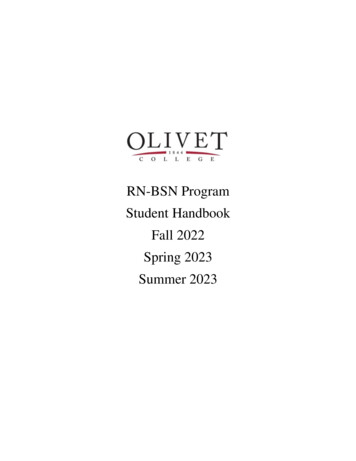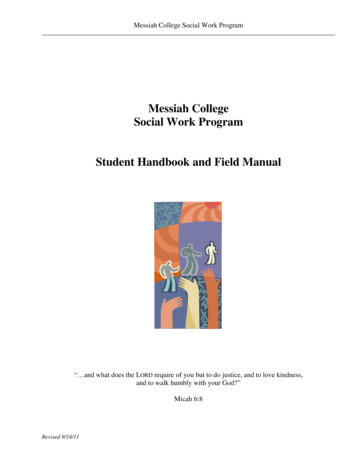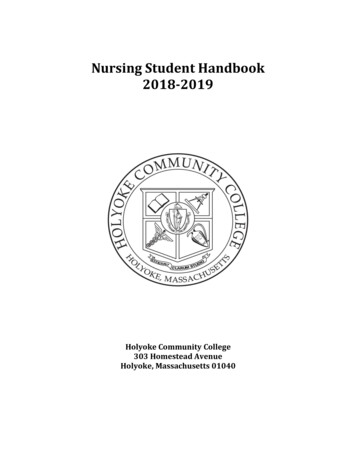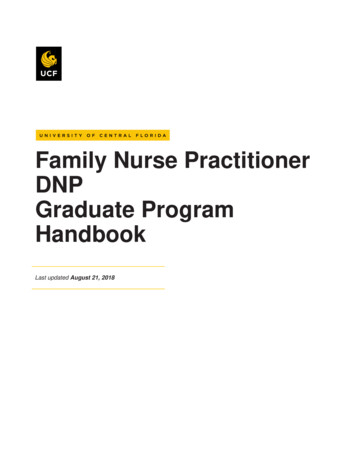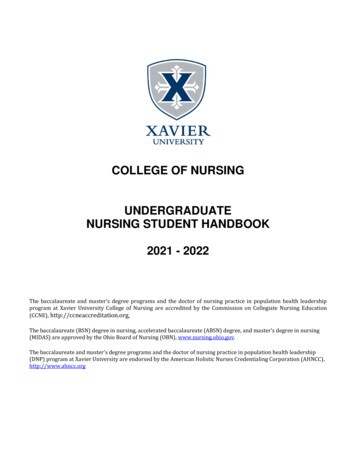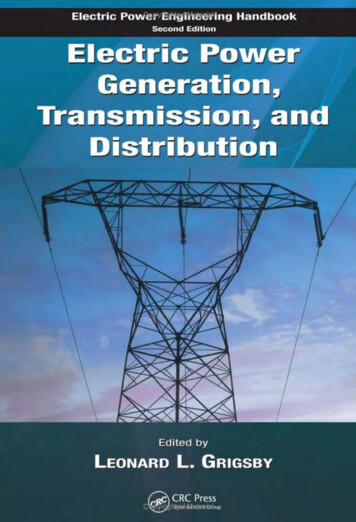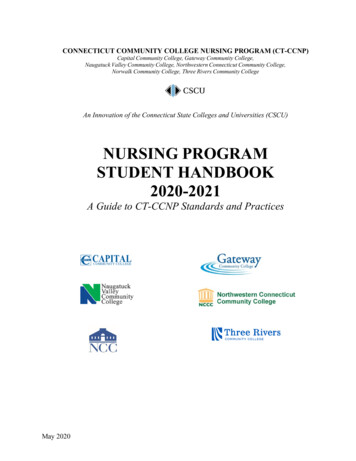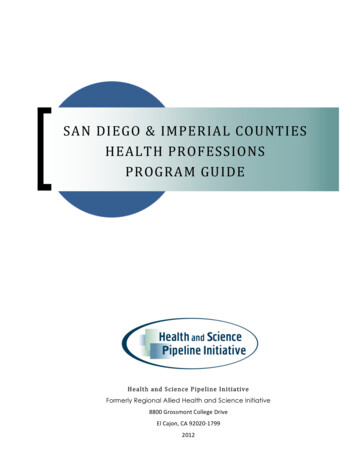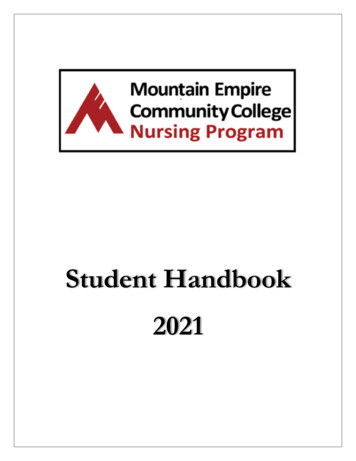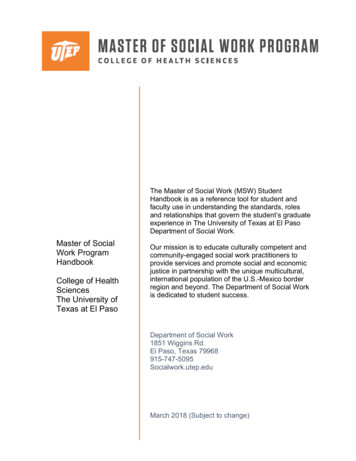
Transcription
The Master of Social Work (MSW) StudentHandbook is as a reference tool for student andfaculty use in understanding the standards, rolesand relationships that govern the student’s graduateexperience in The University of Texas at El PasoDepartment of Social Work.Master of SocialWork ProgramHandbookCollege of HealthSciencesThe University ofTexas at El PasoOur mission is to educate culturally competent andcommunity-engaged social work practitioners toprovide services and promote social and economicjustice in partnership with the unique multicultural,international population of the U.S.-Mexico borderregion and beyond. The Department of Social Workis dedicated to student success.Department of Social Work1851 Wiggins Rd.El Paso, Texas 79968915-747-5095Socialwork.utep.eduMarch 2018 (Subject to change)
Table of Contents: MSW HandbookWelcome from the Department Chair . 3Program Faculty. 4THE UNIVERSITY OF TEXAS AT EL PASO MSW PROGRAM . 6Introduction to the Handbook . 6The University of Texas at El Paso MSW Program . 6MSW Program Goals . 7Eligibility for Admission . 8MSW Program Concentration . 9Foundation Year Course Exemptions, Waivers and Transfer Courses . 10Practice Course Sequencing . 10OVERVIEW OF CURRICULUM . 11MSW Advanced Standing Program . 15Electives in Social Work . 15MSW Approved Electives . 15THE PRACTICUM FIELD EDUCATION PROGRAM. 16MSW PROGRAM POLICIES AND PROCEDURES . 16Student Representation. 16Student Association of Social Workers (SASW) . 16Grading. 18Termination of Student’s Enrollment in MSW Program . 19Academic Advising . 21PROGRAM AND UNIVERSITY POLICIES . 23Residency Requirement . 23Completion of the MSW Program – Time Limits . 23Degree Completion Planning . 23Degree Application Procedures . 23Establishing Candidacy for Graduation . 24Commencement . 24Student Rights and Responsibilities . 24Student Rights . 24Services for Students with Disabilities . 24Academic Integrity . 251.2.2 Prohibited Conduct . 25Plagiarism . 26Issues of Student Conduct . 261
Faculty Review of Student Conduct . 26Review of Student Conduct . 27Student Information . 28Student Review of Information . 28Permanent File . 28Grades of Incomplete or In Progress . 28Academic Ineligibility . 28Reinstatement Following Academic Ineligibility . 29Class and Required Activity Attendance . 29Withdrawing from a Course or from the University . 29Requesting a Leave of Absence (Complete Withdrawal of all courses) . 29Withdrawing from the University . 30Termination from the University . 30Readmission after Termination . 31The University of Texas at El Paso Statement on Sexual Misconduct and Sexual Harassment . 31University Policy of Non-Discrimination On the Basis of Disability . 32Criminal Background Checks and Drug Screening . 32Safety Issues . 32Confidentiality Policy . 32STUDENT ACADEMIC AND PROFESSIONAL DEVELOPMENT . 33ATTACHMENT 1: COMPETENCY ASSESSMENT FROM FOR ADVANCED STANDING . 35ATTACHMENT 2: MSW DEGREE PLAN . 392
Welcome – Bienvenidos(as)Welcome to the Master of Social Work (MSW) Program. We are delighted that you willbe pursing the Master of Social Work at the University of Texas at El Paso in a trulyunique physical and social environment. UTEP sits on a set of rocky desert hills at thebase of the Franklin Mountains overlooking the Rio Grande River and the CiudadJuarez, Chihuahua Mexico skyline. Located at the crossroads of the historic Paso delNorte, UTEP serves a multicultural, bilingual, predominantly Hispanic student body.Situated in one of the largest border metropolitan areas of the world, UTEP is rapidlyachieving international recognition for excellence in research, community engagedscholarship and leadership.UTEP President Dr. Diana Natalicio states, “UTEP a major research university thatserves a 21st Century demographic.” We are successfully transforming this university,pursuing a quest for excellence while strengthening our commitment to access, andthereby creating a new higher education model that is not only working in our setting,but attracting widespread respect and emulation.Our department, faculty, and MSW program courses reflect the region we serve.Professors and instructors, who are predominantly bilingual, conduct research andoutreach on health inequalities, migration, resilience, interpersonal violence, mental andbehavioral health, homelessness, aging and other pressing issues. The MSW Program,which focuses on Social Work in a Border Region, prepares individuals for practice insettings like El Paso and beyond— places that disproportionately serve populations thatare undergoing rapid economic and social transformation. Graduates of the programare professionally prepared to work in any field of social work, from health and mentalhealth, to child welfare and interpersonal violence, military and migrant populations.Graduates possess added skills and knowledge about how to practice social work withdiverse populations.Our region and others like it face enormous challenges and opportunities in health careaccess, substance abuse, mental health care, unemployment, disabilities, migration,and family welfare. MSW students become well-grounded in how to positively addressthese social inequalities. Our approach emphasizes community-engagement, theresilience and strength of individuals and families who are grounded in their culture andcommunity. While confronting challenges, we stress the attributes and strengths of thepeople who have migrated to and settled in this country and this region.We look forward to sharing further with you our excitement as being a part of thisspecial university and MSW Program. We want to be part of who you are and who youwill become. Together, we can make your dreams a reality.Gracias.Eva M. Moya, PhD, LMSWInterim Chair, Associate Professor3
THE UNIVERSITY OF TEXAS AT EL PASO MSW PROGRAM FACULTYEva M. Moya, Ph.D., LMSWInterim Chair, Associate ProfessorCollege of Health Sciences HSSN 429emmoya@utep.edu(915) 747-8493Dr. Moya is an associate professor and Interim chair of the Department of Social Work. Evareceived a Ph.D. in Interdisciplinary Health Sciences from the University of Texas at El Pasoand an MSW from the University of Texas at Austin. Prior to joining academia, she served asdirector of the U.S. Section of the U.S.-Mexico Border Health Commission, Sr. Coordinator forprojects with Project Concern International and the University of Arizona Rural Health Office.Dr. Moya is a Kellogg Leadership Fellow. Expertise include: research and advocacy in U.S.Mexico Border health inequalities, community-engaged scholarship, and macro social workpractice. Her current community-engaged scholarship focuses on homelessness, intimatepartner violence, Nanotechnology-enabled water treatment and social engagement, and HPV.Mark Lusk, Ed.D, LMSWProfessor, Provost’s Faculty Fellow for Civic EngagementCollege of Health Sciences HSSN 433mwlusk@utep.edu(915) 747-8588Mark Lusk is professor of social work and Provost’s Faculty Fellow for Civic Engagement. Priorto joining UTEP, where he has served as associate dean of the College of Health Sciences andas founding chair of the Department of Social Work, Mark was Director of InternationalPrograms at Oregon State University. Professor Lusk has previously served as AssociateProvost of the University of Georgia. Dr. Lusk has been awarded a Senior Fulbright Fellowshiptwice – first at the Catholic University of Peru in Lima and his second Fulbright was at theCatholic University of Rio de Janeiro in Brazil. His current work focuses on migration andrefugees.Candyce S. Berger, Ph.D., ACSWProfessor, Associate Dean of Research & Faculty AffairsCollege of Health Sciences HSSN 369-Ucsberger2@utep.edu(915) 747-5737Dr. Berger received a Ph.D. from the University of Southern California and an MSW fromGeorge Warren Brown School of Social Work at Washington University at St. Louis. Shehas taught at several schools of social work in Tier 1 institutions. Her practice experience isin medical social work and administration where she worked as a clinician, supervisor, andadministrator in university-based teaching hospitals. Research interests include health,administration, aging, and simulation technology.Yok-Fong Paat, PhD., LCSW, MSWAssistant ProfessorCollege of Health Sciences HSSN 427ypaat@utep.edu(915) 747-5789Dr. Paat received her Ph.D. in Sociology and an MSW from the University of Oklahoma inNorman. She received her BSW from Western Michigan University in Kalamazoo. Dr. Paat islicensed by the State of Texas as a Clinical Social Worker. Her practice experience is in theareas of child welfare, social services, and clinical counseling. Her research interests includechildren’s welfare, mental health, community health, family violence, education, migration, andimmigration issues. Dr. Paat is trilingual in English, Chinese and Malay.4
Kathryn Schmidt, PhD, MSWAssistant ProfessorCollege of Health Sciences HSSN 430kjschmidt2@utep.edu915-747-8397Dr. Schmidt received an MSW from New Mexico State University and her Ph.D. and M.S. fromthe University of North Carolina – Chapel Hill. Her practice experience is in the areas of hospiceand sexual violence. Her research interests include LGBTQI people's access to social services;sexual attitudes, behaviors, and experiences of college students; evaluating effectiveinterventions for families and sexual violence.Hyejin Jung, PhD, MSWAssistant ProfessorCollege of Health Sciences HSSN 434hjung2@utep.edu(915)747-5453Dr. Jung received MSW from the University of Alabama and her Ph.D. from the University ofTexas at Austin. She brings an extensive experience in the area of mental health. Dr. Jung’sclinical practice experience includes work in the psychiatric hospitals serving adults and olderadults with diverse backgrounds. Dr. Jung’s research focuses on addressing disparities inmental health service utilization in underserved communities. Her research interests includecommunity-based practice; disparities in mental health care; mental health literacy andeducation; measurement and survey development; mental health in subsidized housing. Dr.Jung is fluent in Korean.Alma Armendariz, MSWClinical Instructor, Coordinator of Field EducationCollege of Health Sciences HSSN 440aarmendariz2@utep.edu(915) 747-6595Ms. Alma Armendariz, Clinical Instructor and Coordinator of Field Education: Ms. Armendarizreceived an MSW from the New Mexico State University and her BSW from The University of Texasin El Paso. Her social work practice experience includes more than ten years in child welfare. Herresearch interests include children and families, and child abuse and neglect.Vivian Jordan-Corral, LMSWInterim MSW Coordinator, Clinical InstructorCollege of Health Sciences HSSN 433vjcorral@utep.edu915-747-6406Ms. Vivian Jordan-Corral, Clinical Instructor and Interim MSW Coordinator, received an MSWfrom New Mexico State University and her BSW from The University of Texas at El Paso. Hersocial work practice experience includes more than 21 years working in all facets of social workwithin the border region. Her areas of concentration include: end of life issues, child welfare,theory and social work intervention modalities.5
THE UNIVERSITY OF TEXAS AT EL PASO MSW PROGRAMIntroduction to the HandbookThe Master of Social Work (MSW) Student Handbook is designed as a reference tool forstudent and faculty use in understanding the standards, roles and relationships that govern thestudent’s graduate experience in The University of Texas at El Paso Department of SocialWork. Student questions or concerns that not covered in this manual should be addressed tothe Chair of the Department of Social Work. The Department of Social Work reserves the rightto update or modify any policy or procedure contained in this manual to protect student rightsor to comply with University policy. Any change in policies or other manual content will becommunicated to students through email to all students enrolled in the program. The studentrepresentatives to the MSW Program Committee are responsible for communicating with theMSW students and bringing comments or concerns to the MSW Program Committee meetingsfor discussion and decision-making.The University of Texas at El Paso MSW ProgramThe University of Texas at El Paso MSW Program offers a program of classroom instruction andfieldwork that leads to the Master of Social Work (MSW) degree. The focus and content of thisprogram are guided by the school’s mission, the Curriculum Policy Statement of the Council onSocial Work Education (www.cswe.org), the educational objectives defined by the faculty andprofessional commitments to the social work practice community.The mission of the University of Texas at El Paso Department of Social Work’s is:“. . . to educate culturally competent and community-engaged social workpractitioners to provide services and promote social and economic justicein partnership with the unique multicultural, international population of theU.S.-Mexico border region and beyond. The Department of Social Work isdedicated to student success.”The purpose of the MSW program is to prepare competent social work practitioners to providehigh quality services and leadership to the U.S-Mexico border region. This region is comprisedof El Paso, Hudspeth, Culberson, Jeff Davis, Presidio, and Terrell Counties (totaling an arealarger than Massachusetts) on the U.S. side and the city of Ciudad Juarez on the Mexican side.The complex and changing, multinational, multicultural environment of the U.S.-Mexico regionrequires advanced social work practitioners with professional skills to promote human andcommunity well-being for the various client systems of this region. The program mission andgoals incorporate both a generalist foundation (1st year) and an advanced concentration onSocial Work in the Border Region (2nd year). The generalist foundation is grounded in the“person and environment” construct that requires knowledge, values and skills to span thecontinuum of practice. The second year concentration builds on the generalist foundation,focusing on advanced practice skills that prepare social work professionals who are competentto address the complex social issues that characterize El Paso – Juarez border region.The MSW program operates in keeping with the policies and procedures for graduationestablished by the University and The Graduate School, the accreditation standards set out bythe Council on Social Work Education (CSWE) and the ethics adopted for professional socialwork practice by the National Association of Social Workers (NASW).6
MSW Program GoalsThe goals of the MSW program are derived from the mission statement and reflect thepurposes of social work education as delineated in EP 1.1 (Council on Social Work Education).1. Promote the development of professional social work identity thatis reflected in a commitment to competent practice through lifelonglearning, participation, and achievement2. Provide advanced social work knowledge, skills, and values essentialto high quality professional practice with individuals, families, groups,organizations, and communities3. Prepare social work graduates with advanced knowledge, skills, valuesand abilities necessary for culturally competent professional practicewithin the international, multicultural context of the U.S. Mexico border(Far West Texas/Southern New Mexico/Ciudad Juarez) region.4. Prepare graduates who are able to use knowledge of mechanismsof oppression to empower client systems at any level in order tocreate social change and to promote social and economic justice fordisenfranchised populations, particularly those living in the borderregion5. Provide a learning environment that embraces an understanding of theutility and process of scientific inquiry as a basis for evidence-basedpractice, and preparing practitioners who are committed to advancingsocial work knowledge with specific attention to work with Hispanicpopulations.The MSW degree program is designed to prepare competent and culturally sensitive social workpractitioners who will work towards enhancing the quality of life and community well-being for allpersons living within the U.S.-Mexico border region. The educational process begins withgeneralist practice where the “person in environment” constructs sets the structure for the firstyear. The second year builds on this generalist perspective, providing more advanced,culturally-relevant practice knowledge and the skills to address the biopsychosocial needs ofclients and to promote social change in community, organizational and political systems thatpromote and sustain social and economic injustice for oppressed and disadvantagedpopulations, particularly within the border region.Students develop a professional commitment to the NASW code of ethics as guiding all aspectsof social work practice, including research. Students are trained to demonstrate commitment toservice and a respect for the dignity and worth of every human being, regardless of race,ethnicity, class, age, religion, gender identity, sexual orientation, immigration status, anddisability, thereby promoting human and community well-being for residents of the U.S.-Mexicoborder region. Students develop an understanding that high quality services are dependentupon the use of culturally appropriate interventions that are scientifically valid. The developmentof professional knowledge and skills is a reciprocal, life-long process based on practiceexperience and scientific inquiry.The educational process in the MSW program is built upon the following: essential skilldevelopment in critical thinking, commitment to professional values and ethics, and theintegration of social work knowledge, values, and skills into all levels of social work practice.The program prepares culturally competent leaders who are dedicated to promoting socialand economic justice for all individuals and preventing conditions that encourage oppression.7
Eligibility for AdmissionA baccalaureate degree from an accredited university or college is required for admission to theMSW program. No credit is granted for life and/or work experiences. Students considered foradmission to the Master of Social Work program must meet the following criteria: An earned bachelor’s degree from a college or university accredited by arecognized regional or international accrediting body. A cumulative grade point average of 3.0 (a lower overall GPA may be consideredas long as the GPA within the undergraduate major is at least a 3.0). An undergraduate course in statistics (within the past 5 years from point of admissionand having earned a grade of C or better). An undergraduate course in general biology, anatomy, or physiology (grade of Cor better). International students may need to submit TOEFL, PTE or IELTS exam scores tothe Graduate School. Check with the Graduate School for more information. Additional criteria used in evaluating the application include: Personal statement based on four questions contained within the application Three professional references (supervisors, professors, professional colleagues) Resume (including work, volunteer and internship experience, membership andleadership in community and/or professional organizations, publications,workshop/community education presentations, awards or honors, and continuingeducation received)Experience Summary Sheet that outlines all work and volunteer activitiesCompetency Assessment Form for Advance Standing applicants only (See Attachment1). Conditional Admission StatusIf a student is admitted in the final semester of their undergraduate year, the student will receivea “Conditional Admission” pending final verification of graduation from an undergraduateprogram. Students may start the MSW Program before the final transcript is received; however,they will be administratively withdrawn if verification of a completed undergraduate degree is notreceived by the end of June. If a student has been admitted to the MSW Program under a“Conditional Admission” status for other reasons (such as pre-requisites not completed), thestudent will have up to three semesters (summer, fall and spring) to fulfill the conditionalrequirements.The student’s advisor will review and approve all students’ registration. This enables the advisorto monitor and support the student’s progress towards the completion of the conditionalrequirement. If the requirements have not been met by the end of the third semester, thestudent will not be allowed to register and must take a “Leave of Absence” until the requirementhas been fulfilled. This could result in a delay in graduation.An extension of the time period for completion of the conditional requirement may be grantedunder justifiable circumstances; all written requests must be submitted and approved by theCoordinator of the MSW Program. Once a student has met the conditional requirement, theymust notify the Coordinator in writing or by email requesting removal of the conditional status,and must produce evidence that the requirement has been fulfilled. It is the student’sresponsibility to submit an unofficial transcript showing that they have completed all therequirements to remove the “Conditional Admission.” The Coordinator will then notify theGraduate School requesting removal of the conditional status.8
Background ChecksPlease note that a number of the agencies in which we place students in practicum internshipsrequire formal criminal background checks. These agencies include all State of Texas agencies, allschools, all placements serving children, courts and all health care settings. In addition, most of theagencies that are health-related or criminal justice-related require drug screening.In Texas, the Texas State Board of Social Work Examiners regulates social work professionalpractice. A formal criminal background check is required to sit for the exam. Currently licensedsocial workers are also required to report any new arrests or convictions. Social Workersemployed by state agencies in Texas must pass a criminal background check as a condition ofemployment. This is also true for federal agencies such as the Veteran’s Administration.MSW Program ConcentrationThe concentration for the MSW program is Social Work in the Border Region, which is infusedthroughout the educational program (30 credits). It builds on the Foundation coursework offeredin the first half of the curriculum that prepares social work students for generalist practice. Theconcentration extends the generalist foundation to provide advanced knowledge and skills toprepare social workers to address the complex social and health problems specific to the U.S.Mexico border region.The MSW program is committed to educating culturally competent, advanced social workpractitioners to serve the needs of the border region. The table below breaks out the coursesaccording to the Foundation and Concentration requirements. The Concentration coursework isdesigned to provide students with advanced theoretical knowledge, practice skills and values asapplied to fields of practice and to special populations within the multicultural, bi-national U.S.Mexico border region and beyond.The curriculum may be completed through either a full-time or part-time enrollment. SeeAttachment 2 (Degree Plan). The specific curriculum experience is carried out through 30 credithours of Foundation course work. Most courses must be completed before entering theadvanced curriculum year. Entering students who have received equivalent experience in abaccalaureate degree in a social work program accredited by CSWE may be considered foradmission to the Advanced Standing (Concentration curriculum).Courses for Foundation and ConcentrationFOUNDATIONThe Social Work Profession (3)Social Policy I (3)Social Policy II (3)Theory and Practice with Individuals (3)Theory and Practice with Families (3)Theory and Practice with Groups (3)Research Methods (3)Foundation Practicum I (3Foundation Practicum I (3)Free Elective (3)TOTAL CREDITS (30)CONCENTRATIONSocial Work in the Border Region (3)Culturally Grounded Social Work Practice (3)Theory and Practice with Organizations (3)Multi-cultural Macro Practice (Community) (3)Clinica
Master of Social Work Program Handbook College of Health Sciences The University of Texas at El Paso . MSW Assistant Professor College of Health Sciences HSSN 427 ypaat@utep.edu (915) 747-5789 Dr. Paat received her Ph.D. in Sociology and an MSW from the University of Oklahoma in Norman. She received her BSW from Western Michigan University in .

